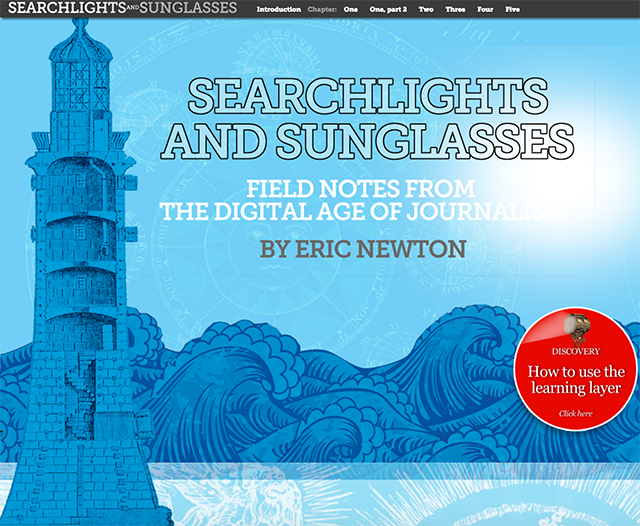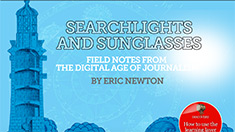Explore

Related LinkS
“Navigating Knight’s new book: Choose your own adventure” by Amy Smitz on Knight Blog
‘Pencils down everyone. Your digital toolbox is here’: Five lessons from ‘Searchlights and Sunglasses‘ – by Ruben O. Valadez on Knight Blog
“Getting students to ask tough questions: My 5 favorite parts of ‘Searchlights and Sunglasses’ “ by Mark Goodman on Knight Blog
Through the centuries, we have used the symbol of a shining light to signal a search for truth. Old Diogenes looked with his lantern for an honest man. The prophets revealed the light of religious truth. The Dark Ages were bad; the Enlightenment, good. It seems only natural that journalists, when their time came, would take the metaphor to heart. From America, Mark Twain reported: “There are only two forces that can carry light to all corners of the globe — the sun in the heavens and The Associated Press down here.” Today on their websites, Scripps company newspapers display their logo, a bold blue lighthouse, shining the light “so people can find their own way.”
I thought of this one day on Miami Beach, where the summer sun beat down like a Caribbean drum, a pat-a-bee-bee-bam on hot steel. I was looking for my friends in the crowd but could not see a thing. The light was just too bright. Everyone was hiding in plain sight. Even squinting, I could not see them through the glare.
A lantern, lighthouse or any kind of searchlight, I did not need.
I needed a pair of sunglasses.
Wandering blindly on scalding sand, it’s funny what you think about. Diogenes wandered too, a cynical ascetic who was not really looking for the truth, but carrying his lantern during the day to mock all that was Greek. Diogenes was a contrarian. And he had a point: Light is not always good, nor is darkness always bad.
In the digital age of communications, journalists need new metaphors. Shining a light works when information is scarce, and it still is, at times. But today news also can be abundant. When everything is already all lit up, a searchlight is just another thing you can’t see. Think of it: The Internet has become a perpetually open library of the human mind; social media, the new Messenger God of breaking news; more data produced every second than can be consumed in a lifetime. The glare is overwhelming. Truth hides in the open.
Today, journalists who want to help us see, to help us find our way, must find a way to provide sunglasses to calm the blinding light. We need honest filters. We need journalistic search engines and tools that dig deep for facts. We need digital sunglasses — technology that can tell you if social media is being generated by software like Twitter Bots or by the public relations people who manage online reputations. The role of professional journalism is not shrinking. It’s growing. We need to verify and clarify stories, but also navigate and curate cyberspace.
Thinking digitally could save us.
…
